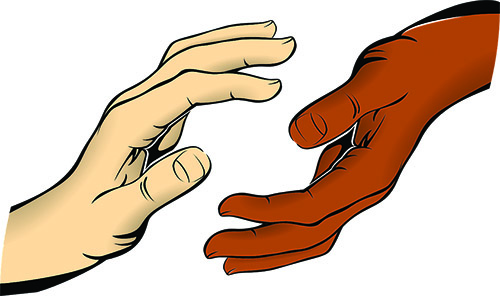
In August of last year, after multiple allegations of sexual assault against him, Andrew Cuomo declared, “I never touched anyone inappropriately.” This is a common but misguided justification for body-boundary violations.
Cuomo asserts that his behaviors weren’t appropriate, however, he never mentions whether the women he touched wanted to be touched. His focus is on appropriateness or correctness, rather than bodily autonomy.
This approach is familiar. When I was in yeshiva day school, the first—and only—time we talked about physical touch was in the context of appropriateness and the laws of shmirat negiah. Touch was either permissible according to halacha and social norms, or not.
But before any conversations with kids about shmirat negiah or context-appropriate behavior, we must address—early and often—the guiding value vis-à-vis physical touch: bodily autonomy.
Bodily autonomy is the human right that every person has to make decisions about their body so long as it doesn’t infringe upon the rights of others. Although this can be expressed a little differently for children when it comes to their safety, health and hygiene (e.g., getting vaccinations, sitting in a car seat), there are many situations in which they deserve full say over their bodies.
When appropriateness or law (like shmirat negiah) are the primary lenses through which we view touch, we leave opportunities for discomfort at best and abuse at worst. It can be socially appropriate and halachically acceptable for a husband to have sex with his wife (who is not niddah), for a rebbe to hug his male student after he finishes a masechet, or for students to roughhouse during recess, but those facts are irrelevant if both parties aren’t interested in the interaction.
When bodily autonomy guides our decisions about touch, and how we teach kids about touch, we build a foundation for the laws of shmirat negiah and taharat hamishpacha while giving our children the tools to understand body boundaries in all interpersonal relationships.
With the accusations and death of Chaim Walder, I hear many people asking, “How do we protect our kids from abuse?” This question is a deeply important one. We also need to ask, however, “How do we protect our young people from becoming abusers?” For many parents, the thought of their child perpetrating such harm is unthinkable. But if every Jewish parent’s child is raised properly such that they would never do such a thing, where are the Chaim Walders of the world coming from? With accusations of assault against too many community rabbis, the excuse that “my child was raised with strong Jewish values” falls short. No child is born a perpetrator, so we must ask ourselves where we are failing them along the way. We need to protect our children from undergoing abuse; we also need to protect our children from perpetrating abuse.
When our primary emphasis is on bodily autonomy, rather than on social correctness, we help our children to internalize the value of individual body rights. We provide them with more than the language to assert their boundaries; we give them the language, the space, the mandate, and the skills to ask, check-in and handle a “no” in all situations relating to physical touch. It doesn’t matter if an interaction is appropriate or halachically permissible if our children don’t have the skills to navigate an interaction that respects both parties’ bodily autonomy.
Sarah Casper is a Consent Educator and the founder of Comprehensive Consent. Visit comprehensiveconsent.com to learn more.











